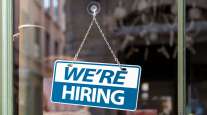Trucking Adds 5,900 Jobs in July
This story appears in the Aug. 16 print edition of Transport Topics.
Trucking added 5,900 jobs in July as payrolls in the private business sector increased by 71,000, despite an overall loss of 131,000 jobs, largely because temporary census jobs ended, the Department of Labor reported Aug. 6.
The unemployment rate remained at 9.5%, Labor said, because about 180,000 people stopped seeking work in July and were removed from the unemployment totals.
“I’m not surprised that trucking continues to boost employment, especially since large truckload carriers are beefing up their driver recruitment departments,” Bob Costello, chief economist of American Trucking Associations, told Transport Topics. “I suspect there are some driver additions, but that is not the bulk of the hiring, at least not yet.”
“Overall, job creation is lower than one would expect after such a deep recession, but the private sector is adding employment, which is positive,” Costello added.
ATA’s weekly economic report, issued after the Labor Department’s release of employment statistics, said that the key point in the report was that the private sector has added jobs for seven consecutive months, totaling 630,000.
BLS said that manufacturing increased by 36,000 jobs in July, raising total gains in the sector by 183,000 in the past seven months.
“The primary weakness of late has been government jobs,” Costello added.
Government employment fell by 202,000 in July, from cuts in federal, state and local employment, DOL’s Bureau of Labor Statistics said, with the main reason being, “the departure of 143,000 temporary Census 2010 workers from federal government payrolls.”
“In July, employment in transportation and warehousing edged up by 12,000,” BLS said. “Since a recent low in February, transportation and warehousing has added 56,000 jobs.”
Trucking payroll jobs have grown by 8,900 to date this year, BLS said.
Initial news reports were gloomy.
“Economic recovery sputters as companies add only 71,000 jobs in July,” the Washington Post said in the headline on its website story.
The New York Times said that the private-sector employment increase fell short of the 90,000 new jobs in the “consensus” expectations of economists.
“Figures released [Aug. 6] confirmed that the United States economy slowed in the spring, and the Department of Labor’s monthly statistical snapshot of hiring pointed toward a stall in hiring this summer, as employers failed to add jobs at the rate they were earlier this year,” the Times said in its story.
“I think many economists were overly optimistic when the recovery started,” Chris Brady, president of Commercial Motor Vehicle Consulting, Manhasset, N.Y., told TT.
“This is still a recovery but a real, real sluggish recovery,” he said, “because consumers are still increasing their savings and paying off debt, and consumer demand is the main force in this economy.”
Brady pointed out that household wealth was still down a national average of 22% from its peak in 2007.
“Government action is not going to change consumer behavior,” he said. “We’ve always said that we expected freight to slow down in the second half of the year because retailers and wholesalers have replenished their inventories by now, and future orders depend upon consumer spending.”
Fleets have been just as cautious as their customers, Brady said.
“For carriers, no one has seen a reason to be overly aggressive in expanding capacity,” he said. “They’ve instead increased utilization of the fleets they had to maximize profits. They’ll also get more pricing power as freight increases down the road in this recovery.”
Like ATA’s Costello, Brady said the most important aspect of the report was the steady recovery in private-sector jobs.
“In addition, the BLS generally misses a lot of new jobs in the early stages of a recovery, because a lot of them are created in start-up businesses,” Brady said.
President Obama said in an Aug. 6 speech posted on the White House website, “We’ve now added private sector jobs every month this year, instead of losing them, as we did for the first seven months of last year.”
“We also know, from studying the lessons of past recessions, that climbing out of any recession, much less a hole as deep as this one, takes some time,” Obama said. “The road to recovery doesn’t follow a straight line.”




